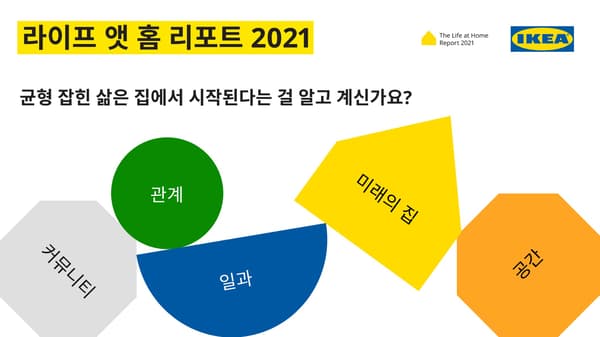IKEA ‘Life at Home Report 2021’

[Seoul – October 20] Global home furnishing retailer IKEA has released the ‘Life at Home Report 2021’. This year marks the 8th edition of the 'Life at Home Report', which is an annual global study conducted since 2014 to get a clearer understanding of life at home today – and how IKEA can help make it better for everyone. This year it surveyed and engaged with more than 34,000 people in 34 countries including Korea.
As the importance of the home grows as the pandemic continues, it has been revealed that the home people love can help protect their wellbeing. Compared to 12 months ago, 40% of respondents who felt more positive towards their home also saw a positive impact on their mental health. In particular, 48% of people in South Korea are feeling more positive about their homes compared to before the pandemic, which is a much higher figure than the global average of 35%. Various findings of the report show that the home was the center of mental wellbeing to get the most out of life based on five key areas (relationships, community, space, rituals, and future home).
◆ Mental stability found in relationships at home
Families have grown closer together over the past 12 months, with four in ten people (42%) saying that their relationships with direct family have improved, and almost a third (31%) consider being near to loved ones more important in an ideal home. Conversely, as fate-to-face meetings became difficult, other relationships have taken a hit, as one in five people (19%) globally say their friendships have suffered over the same period. In-depth interviews revealed that many are now looking for quality not quantity in their relationships. It’s not just about people we build relationships with at home, but everything we nurture and care for, whether it’s greenery, animals or prized possessions has played a significant role in maintaining mental wellbeing.
◆ A sense of belonging through community that resolves emotional needs
Forming a community in difficult times is an important factor in satisfying social and emotional needs. 73% of people around the world say they have spent more time in their neighbourhoods in the last 12 months, and 62% say their mental wellbeing has benefitted from having a sense of belonging in their neighbourhoods. In the time of COVID-19, when meeting face-to-face is difficult, the community is not just about the houses and streets around us, though. It’s also about the communities we create for ourselves with likeminded people, whether online or in person. In particular, 18% of those aged 18 to 34 think gaming is one of the most important things for maintaining a sense of mental wellbeing at home.
◆ Adapting space according to activities done at home
This year, we have seen a major shift in the way people are using and thinking about their homes. Many (60%) have changed the way their home is organised so they can do all the activities they want or need to do at home. In addition, Half of those (47%) who made significant efforts to reorganise their homes now feel more positive about them. As the time spent at home increased, 28% said that spaciousness is one of the things that has grown most in importance and 27% said it became important to have a home that is ‘easy to clean’ and ‘kept clutter-free’ than it was 12 months ago. When things have so often been unpredictable, 84% now say it has become important to organize their home in a new way, indicating that many people want a “hybrid space” where they can work, enjoy hobbies, or relax.
◆ Finding balance through good daily rituals
Throughout 2020 and 2021, the role of the home has been transformed into space for a variety of activities, finding balance through good daily routines has become a key for our balanced mental wellbeing. Sleep (55%) and Relaxing (53%) were the most important activities people globally rated as most important for maintaining a sense of mental wellbeing at home, and reading, watching TV or listening to music were also selected. Many of the respondents said that they were looking for more “me” time at home. The activities we do for ourselves at home are particularly important for our wellbeing. They allow us to learn about ourselves, build our identities and engage in self-expression.
◆ The ideal future home is a space to enjoy being close to nature.
COVID-19 has provided a chance to think about what kind of home we want. The report showed that the ideal home of the future is perceived as 'space for downtime, 'space for nature', and 'space for doing the things they love'. When thinking about their ideal home, the features that have increased most in importance for people in the last 12 months are: having a private garden or balcony (36%), close to green areas (35%), close to family and friends (31%), and space for privacy (29%). 38% globally say they feel the future will be better than today, indicating that many people are feeling stable at home and have a positive outlook for the future.
The detailed results and full version of IKEA ’Life at Home Report 2021’ can be found on the IKEA Life at Home website.